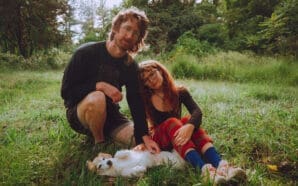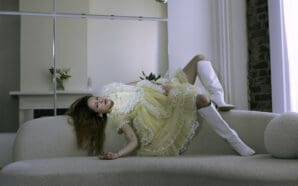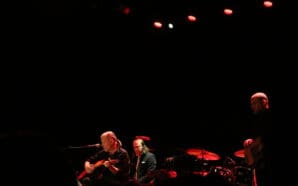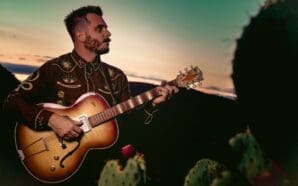Orenda Fink has never been afraid of the darker things in life, whether during her time in Azure Ray or as a solo artist. She’s become known for composing songs that explore the most morbid sides of the human experience. However, her third solo LP, Blue Dream, due out August 19th on Saddle Creek, may be her most focused, intense, and personal to date. It all began with the death of her dog and longtime companion, Wilson, and a quote by Laurie Anderson.
“Just look at yesterday, and what you were doing, and how important it was, and how nonexistent it is now! How dreamlike it is! Same thing with tomorrow. So where are we living? Tibetans have unbelievably fascinating answers to that. This is what I’m studying because my dog died.”
The process of recording Blue Dream saw Orenda searching for the meaning of death and ultimately coming to the realization or the profound impact dreams play in our understanding of the world we live in. The ten=track album plays like an ethereal postmodern take on folk music or the darkest shade of baroque pop, simplistic and haunting. The album was recorded with her favorite people in the world of music, producers Ben Brodin and [husband] Todd Fink, along with drummer Bill Rieflin, of Ministry, Revolting Cocks, and R.E.M. fame. I recently got a chance to chat with Orenda Fink about the journey of realizing this album and she was more than happy to take me through the intensely intimate experience.
Izzy Cihak: So I understand that your latest album, Blue Dream, is the product of a year-long search for the meaning of death, which began with the death of your dog (Sorry for your loss.) How would you characterize that journey? I imagine quite intense, but am curious about the specifics of the experience?
Oranda Fink: It was probably one of the most intense experiences I’ve ever had in my life — but for a lot of different reasons. I expected to be devastated when I lost Wilson — I loved that dog and had had him for sixteen years — but the way his death changed me was something that I could not have prepared for. I had imagined, when he died, that I would lay in bed, dramatically refusing company and food for three days and then emerge like a butterfly from a cocoon, fully grieved and healed out of sight from everyone, and ready to begin a new chapter of my life. But that wasn’t how it happened. The grieving process was long and messy, and I was left with more questions than answers — questions that I had never *really* asked before — like what happens to us when we die? Is there a soul? Is there an afterlife? Does consciousness exist separate from the body? Or is it all just over? Lights out, good night. I couldn’t bear the thought of the latter and facing the reality of that possibility threw me into something like an existential crisis. I started seeing a psychotherapist who specializes in grief counseling and Jungian dream analysis and it was then, about six months after Wilson had died, that I started having dreams of a different nature. They came to me nightly, one after another — some heartbreakingly beautiful and some disturbing and even terrifying. Wilson figured prominently in them in the beginning — shapeshifting from a six-week-old puppy to a dog ancient and mutated as the stories dictated. But as these dreams guided me through the grief process, his presence began to give way to other characters — people alive and dead — some I knew, some I didn’t, oracles, family members from past and present, sometimes even a discorporated voice speaking in the darkness of my subconscious. The one thing in common was that they all had a message — and that message was about death. When I would wake from these dreams I would record them all in detail and pick the most intense ones to analyze with my therapist that week. There was nary a week that I left with dry eyes, dazed at the beauty and breadth of the symbology of these dreams. Finally, the dreams stopped just as suddenly as they came. But during the course of them I had changed. I believe there is life after death now. I believe we are all connected by a collective consciousness, and there is no beginning or ending to that consciousness. That’s about all I’m sure about, and maybe that’s all we can know, but it’s more than I knew before — and I think it saved me from being a broken person and gave me the spiritual framework to deal with death in the future. I didn’t set out to make a record about all of this, per se, but this was all going on in my life when I was writing the songs that ended up being Blue Dream, so they can’t help but to be heavily influenced by this experience.


Izzy: How is it that you feel as though this search changed you most significantly… assuming you think it did?
Orenda: I have always had a pretty active dream life, but this experience solidified my belief that dreams are vitally important to personal growth and are a look into not only our own souls but into the collective soul of mankind. It is the closest thing to God that I have ever experienced. I think Carl Jung is a genius.
Izzy: Sonically, how do you feel the album compares to your previous efforts? Do you consider it to be a natural progression?
Orenda: I think this is my most focused solo record. Probably because I was so depressed [laughs]. But strangely, it also may be the most poppy. Go figure.
Izzy: I’ve heard that you consider the group of people who you worked on Blue Dream with to be your “dream team.” How would you characterize your process of working together?
Orenda: This was my first time working with these guys together, so we kind of invented the process as we went along. Bill flew out and recorded drums first. I had not sent him any demos, so he went with his natural instincts as he listened to the songs for the first time in the studio. I think this created an interesting base for the record because he didn’t sit with the songs in advance and consider the lyrical content, rather he went with what the song itself asked for in regards to the drums. I really love what he did. After Bill left we began creating the rest of the record. Ben Brodin played most of the instruments and Todd and I helped sculpt the sound conceptually. I just walked around most of the time and said, “It needs to sound more like a *dream*.”
Izzy: Not to detract from your own music but, while we’re sort of talking about him, how crazy and great and bizarre is Bill Rieflin’s career? I still can’t get over the fact that someone could go from playing with Ministry, Revolting Cocks, and Pigface to being in R.E.M. and then back to playing with bands like Swans and KMFDM. Do you have any particular favorite records he’s played on?
Orenda: Oh my god. Don’t get me started on Bill! I adore this man and feel so honored that he was a part of this record. I don’t have a favorite record, per se, but I also love how varied his career and tastes are. He’s a very inspiring person.
Izzy: And, finally, what’s looking to be in your immediate future, whether it relates to your work as a solo artist or not? What are you most excited to get to work on? Any chance of a tour?
Orenda: We’re working on a tour for September, so that’s probably what I’m most excited about now. I haven’t toured solo in many years, so it’s about time for me to get on the road!








